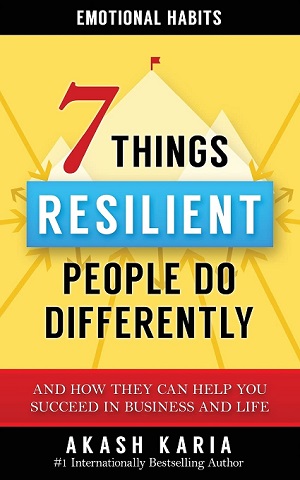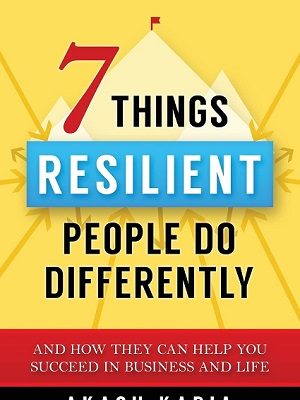Emotional Habits: The 7 Things Resilient People Do Differently by Akash Karia is a practical guide to developing emotional resilience, a key factor in both personal and professional success. Karia explores the habits and strategies that resilient people use to navigate challenges, manage stress, and maintain a positive outlook. Below are the 7 habits:

Read: The Power of Habit
Habit 1: Practice Positive Reframing
1. The Power of Perspective
- Concept: Resilient people have the ability to reframe negative situations and see them in a more positive light. This skill, known as positive reframing, allows them to find opportunities in adversity and maintain a hopeful outlook.
- Application: When faced with a challenge or setback, consciously look for the silver lining or potential lesson in the situation. Ask yourself, “What can I learn from this?” or “How can this experience make me stronger?”
- Example: If you miss out on a job promotion, instead of dwelling on disappointment, you might reframe the situation by focusing on the new opportunities available to you, such as improving your skills or exploring other career paths.
2. The Role of Cognitive Restructuring
- Concept: Cognitive restructuring is a psychological technique used to challenge and change negative thought patterns. It’s an essential tool for positive reframing.
- Application: Identify negative thoughts as they arise and challenge their validity. Replace them with more balanced, constructive thoughts.
- Example: If you find yourself thinking, “I’ll never succeed at this,” challenge the thought by asking, “What evidence do I have for this belief? What successes have I had in the past?”
Lesson: Positive reframing is a powerful habit that enables resilient people to see challenges as opportunities for growth. By consciously shifting your perspective and using cognitive restructuring techniques, you can maintain a positive outlook even in difficult situations.
Habit 2: Maintain an Attitude of Gratitude
1. The Benefits of Gratitude
- Concept: Gratitude is closely linked to happiness and resilience. Resilient people regularly express gratitude for the positive aspects of their lives, which helps them maintain a positive emotional state.
- Application: Develop a daily gratitude practice by listing three things you’re grateful for each day. This simple habit can shift your focus from what’s lacking to what’s abundant in your life.
- Example: At the end of each day, reflect on moments of kindness, achievements, or simple pleasures that brought you joy. Over time, this practice can increase your overall sense of well-being.
2. Gratitude Journaling
- Concept: Writing down what you’re grateful for amplifies the benefits of gratitude. It helps solidify positive thoughts and creates a record of positive experiences.
- Application: Keep a gratitude journal where you document your daily gratitude list. Revisit your journal during tough times to remind yourself of the good things in your life.
- Example: A manager might write in their gratitude journal about the teamwork and dedication they observed during a challenging project, reinforcing their appreciation for their team.
Lesson: Cultivating an attitude of gratitude is essential for building emotional resilience. By focusing on what you’re thankful for and maintaining a gratitude journal, you can enhance your emotional well-being and stay resilient in the face of adversity.
Habit 3: Cultivate Mindfulness and Presence
1. The Importance of Mindfulness
- Concept: Mindfulness involves being fully present in the moment, aware of your thoughts, feelings, and surroundings without judgment. Resilient people use mindfulness to manage stress and maintain emotional balance.
- Application: Practice mindfulness through meditation, deep breathing, or simply by paying attention to your thoughts and sensations throughout the day. Focus on the present moment rather than worrying about the past or future.
- Example: During a stressful meeting, you might use deep breathing to stay calm and focused, helping you respond thoughtfully rather than react impulsively.
2. Mindful Meditation
- Concept: Mindful meditation is a structured way to cultivate mindfulness. It involves setting aside time to focus on your breath, observe your thoughts, and develop a non-judgmental awareness of your mental state.
- Application: Start with short, daily meditation sessions, gradually increasing the duration as you become more comfortable with the practice. Even five minutes a day can make a difference.
- Example: A busy professional might begin their day with a 10-minute meditation session to set a calm and focused tone for the rest of the day.
Lesson: Mindfulness and presence are key habits for emotional resilience. By practicing mindfulness through meditation or other techniques, you can reduce stress, stay grounded in the present moment, and enhance your ability to navigate challenges with clarity and composure.
Habit 4: Build Strong Social Connections
1. The Role of Social Support
- Concept: Resilient people understand the importance of strong social connections. A supportive network of friends, family, and colleagues provides emotional support, advice, and encouragement during tough times.
- Application: Nurture your relationships by spending quality time with loved ones, actively listening, and offering support when needed. Don’t hesitate to reach out for help when you’re struggling.
- Example: A person going through a difficult life transition might lean on their friends and family for advice, emotional support, and companionship, helping them navigate the change with greater resilience.
2. The Power of Positive Relationships
- Concept: Positive, healthy relationships contribute to emotional resilience by providing a sense of belonging and security. These relationships help buffer the effects of stress and improve overall well-being.
- Application: Surround yourself with people who uplift and inspire you. Limit time with individuals who drain your energy or contribute to negative emotions.
- Example: A business owner might seek out a mentor who offers guidance and encouragement, helping them stay resilient in the face of business challenges.
Lesson: Strong social connections are a critical component of resilience. By nurturing positive relationships and building a supportive network, you can enhance your emotional strength and better handle life’s challenges.
Habit 5: Embrace a Growth Mindset
1. The Concept of Growth Mindset
- Concept: A growth mindset is the belief that abilities and intelligence can be developed through effort, learning, and perseverance. Resilient people embrace challenges as opportunities to grow and improve.
- Application: Shift your mindset from “I can’t” to “I can learn.” When faced with a difficult task, focus on what you can learn from the experience rather than fearing failure.
- Example: An employee might view a challenging new project as an opportunity to develop new skills and advance their career, rather than as a threat to their competence.
2. Overcoming the Fear of Failure
- Concept: Fear of failure can hold you back from taking risks and pursuing goals. A growth mindset helps you see failure as a valuable learning experience rather than a setback.
- Application: Reframe failures as feedback that guides your growth. Analyze what went wrong, learn from the experience, and apply those lessons to future efforts.
- Example: An entrepreneur whose first business venture fails might use the experience to refine their business strategy and improve their chances of success in future ventures.
Lesson: Embracing a growth mindset is essential for resilience. By viewing challenges as opportunities to learn and grow, you can overcome the fear of failure and persist in the face of adversity, ultimately achieving greater success.
Habit 6: Develop Emotional Regulation Skills
1. The Importance of Emotional Regulation
- Concept: Emotional regulation is the ability to manage and respond to your emotions in a healthy, constructive way. Resilient people use emotional regulation skills to stay calm and composed, even in stressful situations.
- Application: Practice techniques such as deep breathing, progressive muscle relaxation, or journaling to manage intense emotions. Recognize your triggers and develop strategies to cope with them effectively.
- Example: A manager might use deep breathing exercises to stay calm during a heated meeting, allowing them to respond thoughtfully rather than reacting emotionally.
2. The Role of Emotional Awareness
- Concept: Emotional awareness is the ability to recognize and understand your emotions. It’s the first step in effectively regulating your emotional responses.
- Application: Pay attention to your emotional reactions and identify patterns. Understanding your emotional triggers can help you anticipate and manage your responses more effectively.
- Example: A person who feels anxious before public speaking might recognize the signs of anxiety and use relaxation techniques to calm themselves before a presentation.
Lesson: Developing emotional regulation skills is crucial for resilience. By managing your emotions effectively, you can maintain control, make better decisions, and navigate challenges with greater ease and confidence.
Habit 7: Cultivate Self-Compassion
1. The Role of Self-Compassion in Resilience
- Concept: Self-compassion involves treating yourself with kindness, understanding, and forgiveness, especially in the face of mistakes or failures. Resilient people practice self-compassion to maintain their emotional health and bounce back from setbacks.
- Application: When you make a mistake or experience a failure, avoid self-criticism. Instead, treat yourself with the same kindness and understanding you would offer a friend in a similar situation.
- Example: After receiving negative feedback at work, instead of beating yourself up, you might acknowledge that everyone makes mistakes, and focus on how you can improve going forward.
2. The Benefits of Self-Compassion
- Concept: Self-compassion reduces stress, increases emotional resilience, and promotes overall well-being. It helps you recover from setbacks more quickly and reduces the impact of negative experiences on your self-esteem.
- Application: Practice self-compassion by using positive self-talk, setting realistic expectations, and allowing yourself to make mistakes without harsh judgment.
- Example: A student who doesn’t perform well on an exam might practice self-compassion by reminding themselves that one exam doesn’t define their worth, and they can learn from the experience to do better next time.
Lesson: Cultivating self-compassion is essential for emotional resilience. By treating yourself with kindness and understanding, you can maintain your emotional health, recover from setbacks more quickly, and sustain your motivation to achieve your goals.
Conclusion
Akash Karia’s Emotional Habits: The 7 Things Resilient People Do Differently offers valuable insights into the habits and strategies that foster emotional resilience. The book emphasizes the importance of positive reframing, gratitude, mindfulness, social connections, a growth mindset, emotional regulation, and self-compassion. By adopting these habits, you can build emotional resilience, improve your ability to handle stress, and achieve greater success in both your personal and professional life.
Whether you’re facing challenges in your career, relationships, or personal growth, the lessons from Emotional Habits provide practical tools to help you navigate life’s ups and downs with resilience and confidence. By applying these principles, you can cultivate a resilient mindset, enhance your emotional well-being, and thrive in all areas of your life (Amazon).



